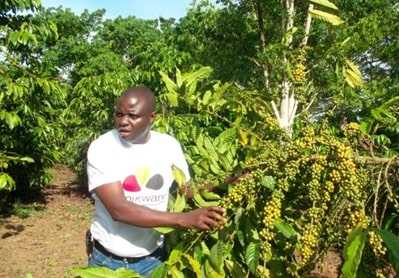MILAN – We interviewed Joseph Nkandu, Founder & Executive Director of NUCAFE, the largest association in the coffee supply chain in Uganda, to learn about his growth as an entrepreneur, founder and executive director of an organization created in response to a simple question: why do coffee farmers in Uganda remain poor despite producing the country’s most important commercial crop? NUCAFE, part of the E4Impact circuit, is the solution.
The E4Impact Foundation promotes and makes win-win partnerships between Italian and African companies operational. We read about how Joseph Nkandu has become the largest employer in the coffee industry in Uganda today, bringing together 1.5 million small farmers organized into 200 business entities of various types thanks to the Farmer Ownership Model of his invention.
Nkandu, how have you become the largest employer of the coffee industry in Uganda?
“Through organizing over 1.5 million smallholder coffee farmers into 215 farmer cooperatives and associations, investing in factories that process coffee, NUCAFE has created entrepreneurial, work and job opportunities for those that work in NUCAFE hybrid network. NUCAFE’s cooperatives and factories are all directly employing over 300 workers directly and over 1000 workers indirectly. NUCAFE also provides entrepreneurial and technical skills which enables the youth to find employability opportunities in the coffee value chain.”
Nkandu, why did you create NUCAFE?
“1. I created NUCAFE in order to break the intergenerational poverty among smallholder coffee farmers who toil to produce the coffee that the world enjoys but farmers and their children are always in crisis without making ends meet. Therefore, I created NUCAFE to demonstrate to the world that business is meant to provide a solution and that you can run a successful business without greed and without putting farmers at a disadvantage.
2. I wanted the consumers to enjoy coffee with a human face; coffee business that speaks to sustainability and solves societal problems instead of creating problems. Today NUCAFE’s contribution speaks to a number of sustainable Development Goals including SDG1, SDG5, SDG8, SDG9, SDG10, SDG11, SDG12, SDG13, SDG17.”
What exactly does the Farmer Ownership model you invented consist of?
“The Farmer Ownership Model (FOM) consists of first and foremost mind-set change required of smallholder farmers that they must take ownership by taking responsibility as masters of their own destiny. Farmers assume that nobody is coming to help them but rather themselves. It is a social entrepreneurial model that builds the capacities of smallholder farmers to remain in charge of their own affairs and be responsible for their own actions but work in partnership with other stakeholders as facilitators.
To unpack the Farmer Ownership Model, it consists of the following:
– One is responsible for his actions. With this model, farmers take responsibility to own up their actions for their own transformation, for the good of their customers and to secure the future of their children and society.
– Possession: Farmers continue to hold onto their value added product beyond the farm level.
– Belonging: Because farmers always have small pieces of land, they produce little and in order to have economies of scale, they have to be organized in associations or cooperatives. This is a business readiness prerequisite when developing the farmer ownership model.
– Concern: Every farmer that is a member of the cooperative or association must be concerned about the actions of the other. This could be in terms of ensuring quality of product and repayment of the loan. Bad business practices are avoided as every farmer is another farmer’s keeper.
– Farmer is part of structures, policies and programmes. Farmers must participate in positions of policy and decision making to influence and cause a change in policy or regulatory regimes.
– Farmer has a say on an enterprise e.g. coffee by being able to negotiate a price. Farmers are empowered to negotiate for what should be for them.
– Farmer is knowledgeable about the value chain he/she is in.
– Farmer must take risks to participate in business investments like any other entrepreneurial person.
– Middleman plays a facilitating role: Entities and individuals do not take over ownership of the agricultural commodity until value has been added.
– Shared value and equity. FOM promotes shared value and equity along agricultural value chains to ensure sustainability.
– Value addition: Farmers must invest collectively and individually to upgrade in the value chain so that they can retain ownership over a more value added product that enhances their net income by at least 1.5x.
– Understanding the value chains. Farmers should be knowledgeable and skilful about the value chain they are involved in. Farmers look for relevant information to remain competitive. This way, they are able to capture more value for themselves and their children.
– Traceability: Taking ownership also involves a transparent value chain that is traceable with a story.
– The model is about performance-based compensation and value for money.
– The model promotes and mainstreams gender equity in the organizations among men and women, which helps to enhance labour productivity for the farming household. It establishes fair gender and power relations in the household and along the value chain.
– The model is about sustainagility where by farmers are empowered to build resilience to cope up with the changing circumstances; environmentally, climate change, socially and
economically.
– Lastly; the model encourages patience so that the short terms needs do not compromise the long term needs of the next generations.
– Finally; the Model is about sustainability of agricultural value chains whereby everyone wins. We do this by addressing climate change through investing adaptation and mitigation measures that produce carbon neutral products. We improve the economic plight and social wellbeing of farmers and dignity.”
Nkandu, what still needs to be done to improve the price-related living conditions of farmers in Uganda?
Nkandu explains: “Five things are needed:
1. We continue to invest in industrial solar energy in order to reduce electricity costs by 95% during day time so that the farmer earns more while we are avoiding over 241.3 metric tons of carbon emissions.
2. There is need for appropriate financing (80% of the value) of farmers once they deliver coffee to NUCAFE factories, cooperatives and associations. This helps farmers to add value and achieve the final payment equivalent to the export price far higher than (1.5x) the price given by the middlemen at the farm level.
3. There is urgent need to mainstream and apply the new body of knowledge about the Farmer Ownership Model developed over a period of time to become part and parcel of the new curricula in formal and informal education so that we can prepare graduates with skills that empower them to negotiate for better prices as they carry out business development services with farmer cooperatives and individual farmers. To this end, we are currently establishing a training center that will take care of this new body of knowledge which is required to retool trainers, farmer leaders, cooperatives, associations, teachers, lecturers, policy makers.
Therefore, I am seeking for support to ensure that the center becomes a fully-fledged training and skills development facility. This center will closely co-create and collaborate with many collaborators; foundations, universities, colleges, investors, donors and corporate brands.
4. We are promoting coffee plant adoptions as a new innovation championed by Fattormia and promoted by E4impact and Caffe River. Under this initiative coffee consumers have the opportunity to co-own coffee plants in Uganda regardless of where they are but starting with Italian consumers. This will further increase the price (income) by 9x.
5. Coffee ecotourism: In addition to promoting coffee adoptions, NUCAFE is also supporting Queen of Coffee Africa to establish and manage a coffee ecotourism social business which promotes nature conservation, cultural heritage and a total coffee value chain experience from the farm to cup. This initiative enables tourists to visit homes and farms of coffee farmers and they pay a fee in exchange of the excursions.”
How was the collaboration with E4Impact born and how does it help your project for a sustainable supply chain?
Nkandu: “My collaboration with E4impact was born out of the business collaboration I had with an Italian coffee Company, Caffe River. The Owner of Caffe River, Mr. Marco Dalla Ragione learnt about an impact MBA scholarship from the Altis Business School and Society of the Catholic University of Milan targeting social entrepreneurs in Africa. He informed me about it because he saw the great impact I was creating for smallholder farmers and that I would do more when I acquire more entrepreneurial skills.
He felt that once I pursued an Entrepreneurship for Impact MBA (E4IMPACT MBA) with concentration in social entrepreneurship, it would go a long way to doing a business that transforms communities while creating shared value. Thanks to E4IMPACT Foundation and the Catholic university of Milan for giving me a scholarship for my MBA program. After my graduation, I moved with my MBA business plan to the funders and investors which I have used to establish a farmers’ owned coffee business in Uganda.
I am compassionately proud of seeing my MBA degree in real practice and at the service of farmers and the entire coffee value chain where NUCAFE participates. This is an MBA for impact in communities beyond academic knowledge. E4IMPACT MBA program helps the entrepreneur to balance business and impact objectives which creates a win win for all.
E4IMPACT has continued to link up with more entrepreneurial opportunities such as the Fattormia innovations and also participating in international business forums in Italy where I am always invited to speak before industry players on how to collaborate between Africa and Italy for current and future opportunities. Also it has helped me to further collaborate with other Universities in Africa that are looking forward to reform their curricula whose graduates can become entrepreneurs and can create impact in society.”














